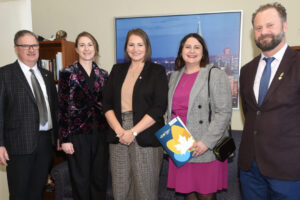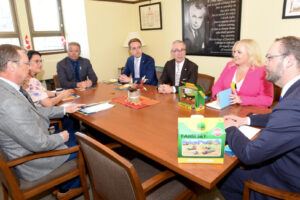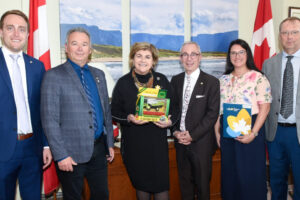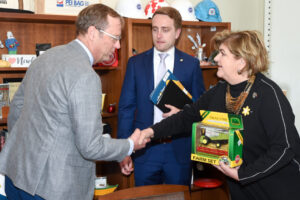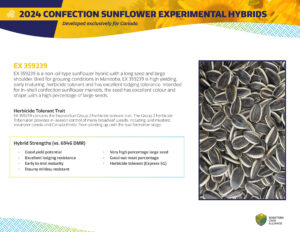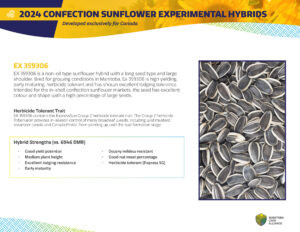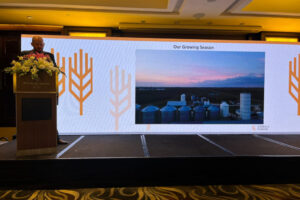After 30 years of farming, becoming a delegate with Manitoba Crop Alliance showed how much I had left to learn

When you’ve been farming your whole life, it’s easy to think you’ve seen and done it all – that there’s nothing else for you to learn about the job or the industry. Thanks to my decision six years ago to put my name forward to become a director for the Manitoba Corn Growers Association, I’m happy to report that couldn’t be further from the truth.
Like many farmers, my introduction to agriculture happened when I was young, growing up on the family farm. I spent some time away to go to university, and then to live and work in New Zealand for a growing season to learn about agriculture there, before returning to the family farm, where I’ve been for the last three plus decades. Through it all, I was extremely curious about the industry and thought about getting more involved, but it still took a bit of a coincidence for me to take the leap.
Six years ago, I was at the CropConnect Conference when I heard that the Manitoba Corn Growers Association was looking for new farmers to join its ranks. I said I might be interested, one thing led to another, and before I knew it, I was in. When Manitoba Crop Alliance (MCA) was formed in 2020 from the amalgamation of the Manitoba Corn Growers Association and four other crop commodity organizations, I stayed on to become a delegate of MCA’s corn crop committee, and then had the privilege to be nominated to serve as one of the inaugural directors for the organization.
I understand there are a lot of reasons people are reluctant to put their name forward. You might be nervous you’re not going to be able to offer much or feel like your opinion might not be needed, but that isn’t at all the case. In fact, it was completely the opposite. The committee and the organization were very welcoming from day one and showed me there was nothing to worry about. My input and perspectives were valued, and it quickly became clear each member of the organization had something unique to offer.
MCA staff are there to support you every step of the way and answer any questions you might have. They are passionate about finding innovative ways to help producers in the province now and into the future, and it feels meaningful to be a part of that important work.
One reason I encourage all farmers to get involved is to help determine where your check-off dollars are invested. Ensuring those investments align with the priorities of farmer members across the province is a major responsibility and one I don’t take lightly. The second reason is just as valuable: becoming a delegate is an incredible opportunity for personal growth.
My time as an MCA delegate has been an amazing learning experience. Manitoba is a diverse province, with many different climates, soils and types of crops being grown. As a result, I leave every crop committee and board meeting having learned something I didn’t know before from one of my fellow delegates or directors. Since 2018, my personal development has been dramatic, taking me from a delegate on the corn crop committee to an MCA director and now to an additional role as a director with the Grain Growers of Canada. During that time, everything I learned about agriculture in Manitoba and across Canada has made me a better farmer and a better advocate for our industry.
None of this would have been possible without taking the first step. As my dad always said, “You can’t finish until you start.” Looking back with those wise words in mind, my only regret is that I didn’t get involved sooner.
So, don’t make the same mistake I did – regardless of where in the province you call home, how long you’ve been farming or how much you think you know, the time to “start” is now.
Jonothan Hodson is a director and corn crop committee delegate with Manitoba Crop Alliance, as well as a director with the Grain Growers of Canada. He and his family farm near Lenore, MB.









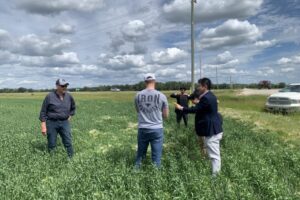
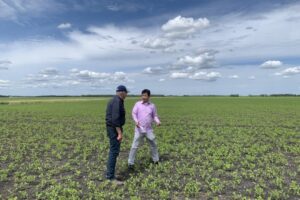
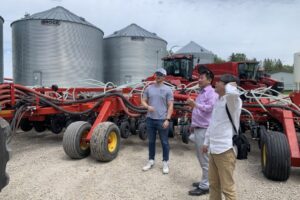



 Scott Mowbray has been a delegate on the wheat and barley committee for one year and sat on similar boards at the community level. He is a delegate for the Keystone Agricultural Producers’ District 2 and sits on the transportation committee.
Scott Mowbray has been a delegate on the wheat and barley committee for one year and sat on similar boards at the community level. He is a delegate for the Keystone Agricultural Producers’ District 2 and sits on the transportation committee. Ryan Hueging joined the Manitoba Wheat and Barley Growers Association in 2019 prior to the amalgamation and is a delegate on MCA’s wheat and barley committee. He served on the MCA board of directors from 2021 through 2023.
Ryan Hueging joined the Manitoba Wheat and Barley Growers Association in 2019 prior to the amalgamation and is a delegate on MCA’s wheat and barley committee. He served on the MCA board of directors from 2021 through 2023. Richard Dureault was originally a director for the Manitoba Corn Growers Association and joined MCA’s corn committee as a delegate after the amalgamation. This was his first experience in this type of role.
Richard Dureault was originally a director for the Manitoba Corn Growers Association and joined MCA’s corn committee as a delegate after the amalgamation. This was his first experience in this type of role. Warren McCutcheon is a delegate on the corn committee and had sat on the Manitoba Corn Growers Association board of directors since 2019 prior to the amalgamation.
Warren McCutcheon is a delegate on the corn committee and had sat on the Manitoba Corn Growers Association board of directors since 2019 prior to the amalgamation. Gregg Fotheringham has served on many boards over the years locally, provincially and internationally, and was involved with the National Sunflower Association of Canada prior to the amalgamation. He is an MCA director and a delegate on the sunflower committee.
Gregg Fotheringham has served on many boards over the years locally, provincially and internationally, and was involved with the National Sunflower Association of Canada prior to the amalgamation. He is an MCA director and a delegate on the sunflower committee. Leigh Smith joined the flax committee in 2023 and the MCA board of directors in 2024. Smith explains the role as “coming forward with an open mind, knowing that you are going to learn something, but also that you have something to offer and that you will be heard.”
Leigh Smith joined the flax committee in 2023 and the MCA board of directors in 2024. Smith explains the role as “coming forward with an open mind, knowing that you are going to learn something, but also that you have something to offer and that you will be heard.”
